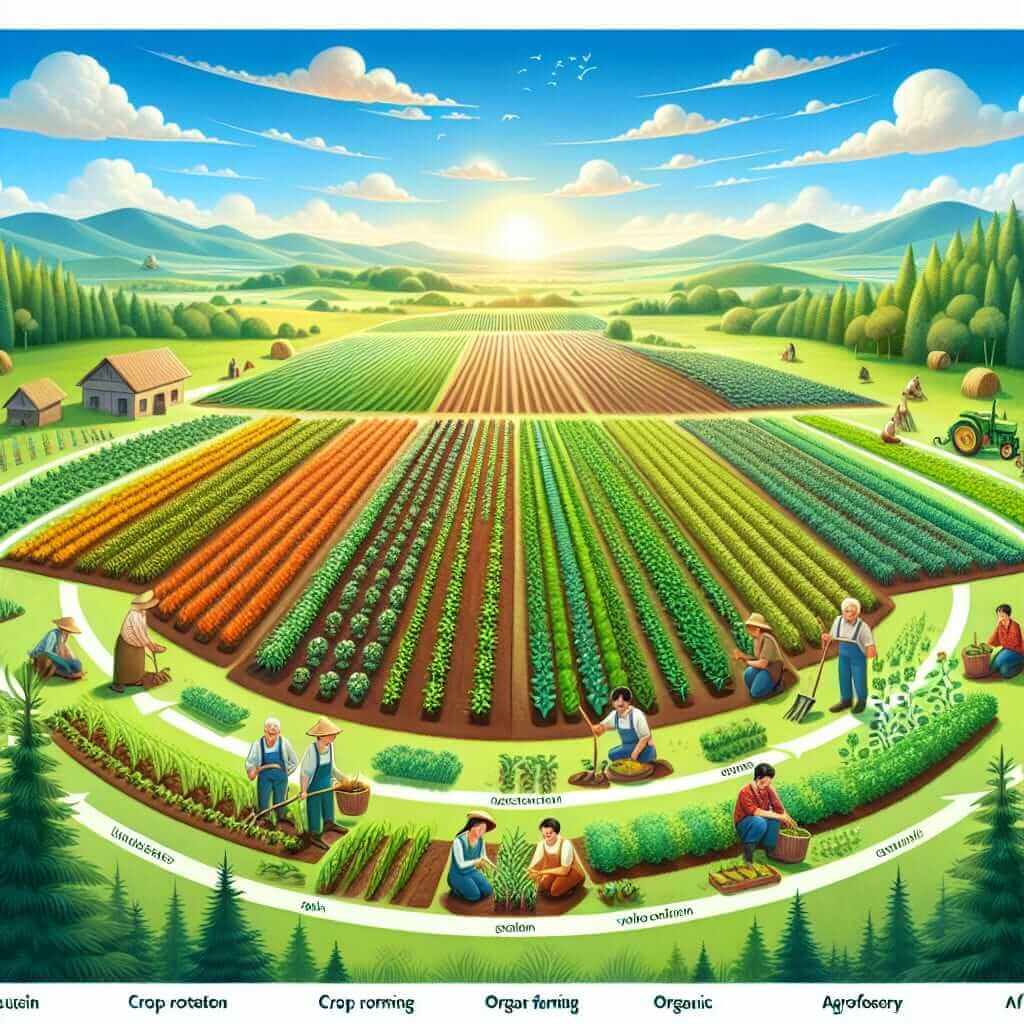Food security is a critical global issue, often exacerbated by the challenges posed by population growth, climate change, and resource depletion. Sustainable agriculture emerges as a potential solution to improve food security. Let’s explore this topic comprehensively, which is common in IELTS Writing Task 2.
Introduction
Sustainable agriculture combines eco-friendly farming techniques and conservation practices to ensure long-term food production. Given the increasing focus on environmental sustainability, this topic frequently appears in IELTS writing tasks, questioning the effectiveness and role of sustainable agriculture in enhancing food security.
Potential IELTS Essay Topics
- To what extent do you agree or disagree that sustainable agriculture is the best strategy for ensuring food security in the future?
- Discuss the advantages and disadvantages of sustainable agriculture in terms of food security.
- Some people believe that sustainable agriculture can solve the world’s food security issues. To what extent do you agree or disagree?
Choose an Essay Topic and Analyze
Essay Question: To what extent do you agree or disagree that sustainable agriculture is the best strategy for ensuring food security in the future?
Analysis:
- Task Type: Opinion Essay (Agree/Disagree)
- Keywords: Sustainable agriculture, food security, best strategy, future
- Task Requirements: Clearly state your opinion and support it with appropriate arguments and examples. Discuss both sides to show a balanced perspective, even if you are leaning towards one view.
Sample Essay
Introduction:
In the face of looming threats like climate change and resource scarcity, sustainable agriculture is heralded as a key solution for securing future food supplies. This essay will argue that while sustainable agricultural practices are essential, they must be part of a broader, multifaceted approach to ensure global food security effectively.
Body Paragraph 1:
Sustainable agriculture is undoubtedly an important component of a comprehensive food security strategy. One primary advantage is that it promotes the efficient use of resources. Crop rotation, organic farming, and agroforestry help maintain soil fertility and biodiversity, ensuring long-term productivity. Studies have shown that sustainable practices can lead to higher crop yields and healthier ecosystems, which are fundamental for ongoing food production.
Body Paragraph 2:
Moreover, sustainable agriculture minimizes environmental degradation. Unlike conventional farming, which often relies heavily on chemical fertilizers and pesticides, sustainable methods reduce pollution and the carbon footprint. This not only benefits the environment but also ensures the viability of agricultural land for future generations. In regions heavily impacted by climate change, such as Sub-Saharan Africa, sustainable practices can mitigate adverse effects and sustain agricultural productivity.

Body Paragraph 3:
However, relying solely on sustainable agriculture may not suffice to address all food security challenges. The initial transition to sustainable practices can be costly and time-consuming, which may be prohibitive for small-scale farmers. Additionally, sustainable methods may yield lower outputs compared to conventional practices in the short term, potentially leading to immediate food shortages.
Body Paragraph 4:
Therefore, a holistic approach is required. Investment in technology, infrastructure, and education complements sustainable practices. Innovations such as precision farming and genetically modified crops can boost productivity without depleting resources. Financial and technical support for farmers transitioning to sustainable methods can also address economic barriers, ensuring a smooth shift to more eco-friendly agricultural practices.
Conclusion:
In conclusion, while sustainable agriculture plays a critical role in ensuring future food security, it is not a panacea. A synergistic approach that includes technological innovation, infrastructure development, and supportive policies is essential for sustainably securing food supplies for the growing global population. Sustainable agriculture, combined with other strategies, presents the most balanced and effective solution.
Word Count: 360
Notes on Writing
Vocabulary and Grammar Tips:
- Use transition words to maintain coherence (e.g., furthermore, however, therefore).
- Vary sentence structures to enhance readability.
- Ensure precision in argumentation; use specific examples where possible.
Challenging Vocabulary:
- Agroforestry (noun) [ˈæɡrəʊ-fɔrəstri]: A land use management system in which trees or shrubs are grown around or among crops or pastureland.
- Mitigate (verb) [ˈmɪtɪɡeɪt]: Make less severe, serious, or painful.
- Footprint (noun) [ˈfʊtprɪnt]: The environmental impact caused by human activities.
- Biodiversity (noun) [ˌbaɪəʊdaɪˈvɜːsɪti]: The variety of plant and animal life in a particular habitat.
- Conventional (adjective) [kənˈvɛnʃənəl]: Based on or in accordance with what is generally done or believed.
Conclusion
Sustainable agriculture plays a pivotal role in ensuring food security, but it must be integrated with other strategies for optimal effectiveness. As you practice, consider alternative perspectives and back your arguments with concrete examples. For further practice, explore related essay prompts:
- What are the potential drawbacks of relying heavily on genetically modified organisms (GMOs) for food security?
- Discuss the role of technology in enhancing agricultural sustainability.
Ensure your essays are well-structured and articulate, reflecting a comprehensive understanding of the topic.